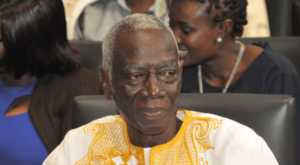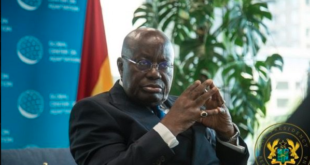A former Chairperson of the Electoral Commission of Ghana, Dr. Kwadwo Afari-Gyan, has spelt out three main concerns he has with the government’s move to use the Ghana Card as the sole identification card for the registration of voters onto the national voters register.
In a statement made available to graphic.com.gh, he explained that the voters register is not a property of any political party in the country, and as such, processes concerned towards modifying or updating it must be done in a manner that is not skewed.
According to the longest-serving EC Chairperson of Ghana, his first concern is with the facts that not many people have the Ghana Card and should the CI that has been placed before parliament come into force, it could disenfranchise millions of eligible voters.
“My first concern is that, simply put, if the CI comes into effect, you cannot register to vote if you don’t have what is popularly known as the Ghana Card. I don’t know if and when the EC intends to do a new register. I have a Ghana Card, so I can register at the next opportunity under the impending CI. Even so, I find the Ghana Card requirement to be worrisome.
“It is common knowledge that, as at now, many Ghanaians who would otherwise be eligible to register as voters do not have the Ghana Card. Information available to me indicates that, as at July 2022, the National Identification Authority (NIA) had actually issued over 13 million cards to Ghanaians, including an unspecified number of persons below the voting age. This figure is much less than the 17 million voters registered by the EC in 2020. On top of that, based on figures from the 2020 Population and Housing Censure, the projected number of Ghanaians aged 18 years and above will be about 19.5 million by the end of 2023. Taken together, the information would indicate that if the EC were to do a new register based only on the Ghana Card any time soon, the likelihood is that millions of Ghanaians might be disenfranchised,” he stated.
Dr. Kwadwo Afari-Gyan stressed that such an arrangement would also be unfair and contradict the principle of electoral justice.
He also wondered, by this CI, if the EC wants to create the impression that “Ghanaian citizens don’t lose their citizenship if they are 18 years or older but do not have the Ghana Card.”
His second concern is with registration centres and registration supervisors, and the fact that this signals to him that there may be fewer registration centres than the number of polling stations in the country.
His third concern, according to his statement, has to do with the register that will be used at the polling station on Election Day. He stressed that if the CI goes through parliamentary approval, it would create two registers on Election Day and this would open “the door more widely to two kinds of voting infractions, namely, multiple voting and ballot stuffing.”
Read the full details of his statement below:
Dr. K. Afari-Gyan
The Electoral Commission (EC) has placed before Parliament a draft of a Constitutional Instrument (CI) entitled: Public Elections (Registration of Voters) Regulations, 2021. I am hopeful that Parliament will do a careful scrutiny of its provisions. I also presume that the Inter-Party Advisory Committee (IPAC) is privy to the provisions of the CI.
Be that as it may, clearly, the voters register does not belong to the political parties, the EC, and Parliament. It is a national property, so it is appropriate for ordinary Ghanaians to express their views on the possible import of the provisions in the impending CI. In that vein, I have concerns about three aspects in particular that I think need to be carefully thought through.
My first concern is that, simply put, if the CI comes into effect, you cannot register to vote if you don’t have what is popularly known as the Ghana Card. I don’t know if and when the EC intends to do a new register. I have a Ghana Card, so I can register at the next opportunity under the impending CI. Even so, I find the Ghana Card requirement to be worrisome.
It is common knowledge that, as at now, many Ghanaians who would otherwise be eligible to register as voters do not have the Ghana Card. Information available to me indicates that, as at July 2022, the National Identification Authority (NIA) had actually issued over 13 million cards to Ghanaians, including an unspecified number of persons below the voting age. This figure is much less than the 17 million voters registered by the EC in 2020. On top of that, based on figures from the 2020 Population and Housing Censure, the projected number of Ghanaians aged 18 years and above will be about 19.5 million by the end of 2023. Taken together, the information would indicate that if the EC were to do a new register based only on the Ghana Card any time soon, the likelihood is that millions of Ghanaians might be disenfranchised.
Clearly, that would be unfair and contrary to the principle of electoral justice. One of the tests of a good voters register is that, as far as practicable, it is inclusive of the persons eligible to register as voters. That aside, in spite of their leading role in elections, election administrators are not, so to speak, kingmakers: the electorate are the kingmakers. So, a basic responsibility of any electoral commission is to facilitate the realization of the peoples’ right to register as voters, and not to obstruct that right by demanding for registration purposes documents that are not easily accessible to the people.
Ghanaian citizens don’t lose their citizenship if they are 18 years or older but do not have the Ghana Card. So, the moot question is: why make the Ghana Card the only means of identification for purposes of establishing eligibility to register to vote? Aren’t there other means of identifying citizens? For a straightforward example, why can’t the Voter ID Cards the EC itself issued to over 17 million Ghanaians in 2020 be acceptable?
My second concern relates to registration centres and registration supervisors. Under the CI, what is known is that every district office of the Commission will be a registration centre. Other centres will be set at the discretion of the Commission. This signals to me that there may be fewer registration centres than the number of polling stations. Where this is the case, the problem of assigning voters to polling stations and letting them know their stations is likely to arise. One way to dodge this problem is
to use a voters register that is not polling station specific on Election Day.
With regard to registration supervisors, there will be a district registration supervisor and a registration centre supervisor. Both supervisors report directly to the regional officer (director) of the Commission, making him/her the only focal point of the registration in the entire region. For me, the audit trail in this arrangement is not sufficient.
I suggest that, for purposes of accountability and verifiability, copies of reports sent to the regional director by supervisors in each district be also sent to the respective district officer of the Commission. Not only are the district officers closer to the registration proceedings in their various districts, but they are also, under the CI, among the “persons who may give instructions or directives to a registration supervisor” and other registration officials.
My third concern has to do with the register that will be used at the polling station on Election Day. Should this sound trite, even stupid, let me explain the basis of the concern.
The practice in Ghana has been that the register for each polling station is unique, such that a name in the register of one polling station cannot, in principle, be found in the register of any other polling station in the country. This contrasts with what I once observed in Zimbabwe. There, the register at the polling station was constituency based, so a registered voter would find his/her name irrespective of the polling station in the constituency s/he went to on Election Day
Under the caption Voters register in the CI, two kinds of register are listed: namely, an electoral area register “consisting of the voters registers of the polling stations in the electoral area” and a constituency register “consisting of the voters registers of the electoral areas within the constituency concerned”. Of course, these registers are not polling station specific.
As far as I know, as at now, the Biometric Verification Devices (BVDs) that are used to identify voters at the various polling stations do not, so to speak, talk to each other in the field to indicate who has voted at which polling station. Until such time that the BVMs are configured to be interactive in this way, my concern about any of the two registers being used at the polling station on Election Day is that it opens the door more widely to two kinds of voting infractions, namely, multiple voting and ballot stuffing. Multiple voting is where one person votes more than once. Ballot stuffing is where an unscrupulous person puts into the ballot box additional ballot papers that were not duly cast in accordance with the election law.
At the same time, using any of the two registers changes the meaning of over-voting from more people voted than were certified to vote at a specific polling station. Over-voting will mean more people voted than the number of persons listed in the electoral area register or the constituency register, as the case may be. Given that voter turn-out is never a hundred percent, this will be extremely difficult, if at all possible, to detect and investigate, let alone prove.
Source: www.ghanaweb.com
 Home Of Ghana News Ghana News, Entertainment And More
Home Of Ghana News Ghana News, Entertainment And More





